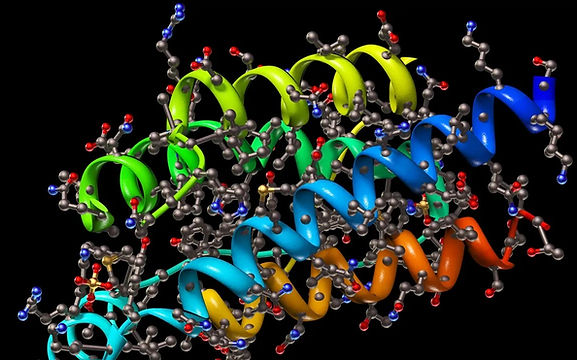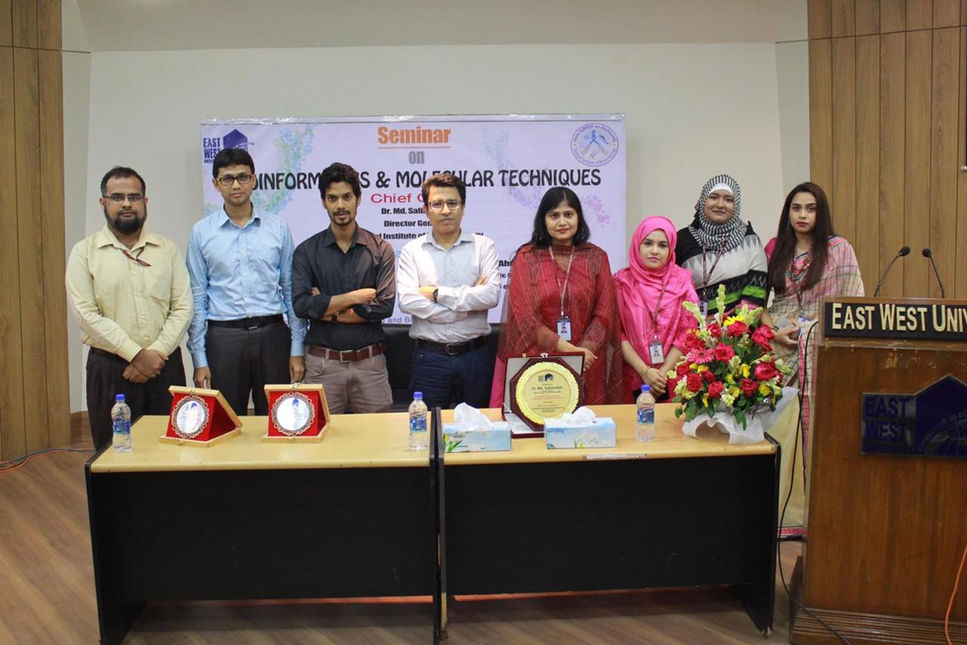

Ministry of Science & Technology
ABOUT US
The Bioinformatics Division at the National Institute of Biotechnology was established on January 4, 2017, with a vision to advance research at the intersection of biology and computational science.
The Bioinformatics Division is driven by a team of highly motivated and skilled scientific officers alongside passionate research associates. Equipped with advanced computational facilities, we provide an ideal platform for tackling complex biostatistical challenges, advancing the frontiers of bioinformatics and data-driven discovery.
Our interdisciplinary team specializes in genomics, proteomics, machine learning, and artificial intelligence, driving breakthroughs in data-driven biological research. We are dedicated to developing bioinformatics tools, genomic analysis pipelines, and computational models that contribute to scientific discovery and practical applications in healthcare and biotechnology.
Through strong collaborations with researchers, institutions, and industries, we work to turn computational biology advancements into impactful real-world innovations.


Message from the Division Head
(Mohammad Uzzal Hossain)
Welcome to the Bioinformatics Division of the National Institute of Biotechnology. As we stand at the forefront of scientific innovation, our mission is to harness the power of bioinformatics, genomics, proteomics, transcriptomics, metagenomics, and artificial intelligence to address pressing challenges in biology, medicine, and agriculture.
We are committed to advancing research that not only contributes to global scientific knowledge but also addresses local needs, such as improving healthcare, enhancing agricultural productivity, and promoting sustainable biotechnology solutions in Bangladesh. Our state-of-the-art advanced computational facility integrated with wet lab validation empowers our interdisciplinary team to analyze complex biological data, develop predictive models, and drive groundbreaking discoveries. We also prioritize capacity building through training programs and collaborations, empowering the next generation of researchers and professionals in Bangladesh. By fostering a culture of innovation and collaboration, we aim to position Bangladesh as a leader in bioinformatics.
Together, we can harness the power of bioinformatics to build a smarter, healthier, and more sustainable future for Bangladesh and beyond.
Mission
The Bioinformatics Division is committed to advancing data-driven biological research that directly addresses the unique healthcare and biotechnological challenges of Bangladesh. With a combination of computational analysis and wet lab validation, we aim to
-
Integrate computational and experimental approaches to address public health challenges.
-
Leverage local genomic and patient data to uncover disease biomarkers, antibiotic resistance patterns, and genetic variations specific to the Bangladeshi population.
-
Build local capacity by training researchers in advanced analytical and experimental techniques.
-
Leverage artificial intelligence (AI), machine learning (ML), and deep learning (DL) to predict disease patterns, identify biomarkers, and discover potential drug candidates for real-life healthcare applications.
-
Integrate AI/ML tools with experimental validation to accelerate the discovery of therapeutic targets and optimize drug development processes.
-
Utilize omics technologies, including genomics, proteomics, transcriptomics, and metagenomics, to explore disease mechanisms, biomarkers, and microbial diversity.

Key Research Area
Genomics and NGS
Our research leverages cutting-edge genomics and Next-Generation Sequencing (NGS) technologies to investigate diarrheal pathogens and their coinfection patterns in patients from Bangladesh. By analyzing the genetic makeup of these pathogens, we aim to uncover their virulence mechanisms, transmission dynamics, and interactions during coinfections, which can inform targeted treatment and prevention strategies.
In parallel, we are conducting whole genome analysis of native cattle, sheep, and goats to explore their genetic diversity, disease resistance, and adaptation to local environments. This work is critical for improving livestock health and productivity, particularly in resource-limited settings.
Additionally, we are focusing on viral pathogens prevalent in Bangladesh, using NGS to identify and characterize emerging and endemic viruses. This includes studying their evolution, spread, and potential zoonotic risks. Together, these genomic approaches provide a comprehensive understanding of pathogen dynamics, contributing to public health and agricultural sustainability in Bangladesh and beyond.

Proteomics and Structural Biology
Our research integrates proteomics and structural biology to address critical health challenges, including cancer, Monkeypox, Salmonella, and Cronobacter infections in Bangladesh. By leveraging advanced proteomic techniques, we identify and characterize disease-specific proteins, enabling a deeper understanding of pathogen-host interactions and cancer mechanisms. In structural biology, we employ molecular dynamics (MD) simulations and molecular modeling to explore the 3D structures of proteins and their dynamic behaviors. These approaches help elucidate molecular pathways, predict drug-target interactions, and design novel therapeutics. For instance, MD simulations provide insights into the conformational changes of viral proteins in Monkeypox or the virulence factors of Salmonella and Cronobacter. Our work aims to bridge the gap between molecular insights and clinical applications, contributing to the development of targeted treatments and preventive strategies for these pressing health issues in Bangladesh and beyond.

Metagenomics
Our research focuses on metagenomics, particularly in clinical samples, to unravel the complex interactions between microbial communities and human health. We have established baseline gut microbiome data for diverse populations in Bangladesh, including the Bengali, Chakma, Marma, Khiyang, and other tribal groups. This foundational work has provided critical insights into the unique microbial signatures of these populations. Additionally, we are investigating the resistome profile of the Bangladeshi population to understand the prevalence and distribution of antimicrobial resistance genes.
Currently, our efforts are directed toward studying the gut microbiota of populations residing in the islands of Bangladesh, such as Nijhum Dwip and Saint Martin Island. By analyzing their microbial communities, we aim to identify indicative patterns that may serve as predictive markers for disease prognosis. This research holds significant potential for advancing personalized medicine and improving public health outcomes in these unique and understudied populations.

Computational and Animal Model Experiments in Drug Discovery
In our pursuit of antidiabetic compounds from native Bangladeshi plants, we integrated computational and animal model experiments to validate potential candidates. Initial screening identified several plants with promising antidiabetic activity, which were further analyzed through pharmacophore modeling to identify key bioactive compounds. These findings were validated using animal models, where the antidiabetic efficacy of plant extracts was assessed through glucose tolerance tests, insulin sensitivity measurements, and other relevant biomarkers. Concurrently, in silico studies, including molecular docking, dynamics simulations, and extensive bioinformatics analysis, were employed to predict compound interactions with diabetes-related targets, such as α-glucosidase, PPAR-γ, and DPP-4. This dual approach ensured robust validation, with computational insights guiding animal experiments and vice versa. By combining traditional knowledge with modern techniques, we aim to identify novel, plant-derived antidiabetic agents, contributing to the development of effective and accessible therapies for diabetes management.

Epidemiological and Pathogen Surveillance
As the first government institute in Bangladesh to sequence the whole genome of SARS-CoV-2 during the COVID-19 pandemic, we played a pivotal role in tracking the virus's evolution and its impact on public health. Our efforts positioned us as the second institution in the country to achieve this milestone. We continuously monitored the mutational landscape of SARS-CoV-2, analyzing the functional implications of acquired mutations and their influence on transmissibility, virulence, and immune evasion. Additionally, we tracked the pandemic's wave dynamics, correlating infection rates with mortality to inform public health interventions.
Beyond COVID-19, we extended our surveillance to the dengue virus, investigating its serotypes and virulence patterns in Bangladesh. Our research combined genomic analysis with in silico validation, providing critical insights into pathogen behavior and guiding outbreak response strategies. These efforts underscore our commitment to advancing epidemiological and pathogen.

Photo Gallery
Contact
Inquiries
For any inquiries or feedback, please call:
+8801303166218
+8801917892166
Contact Us
Mohammad Uzzal Hossain
Divisional In-Charge
Bioinformatics Division
uzzalbge10044@gmail.com

























